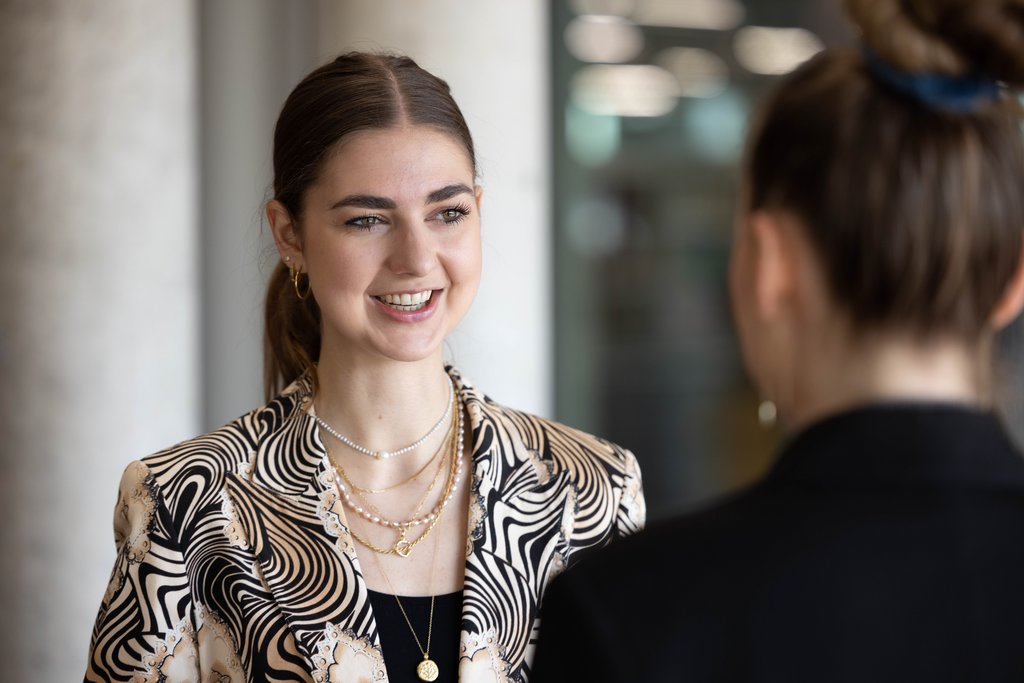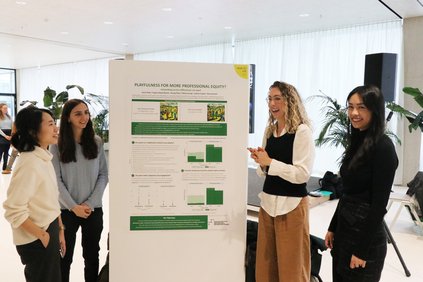Background - 09.05.2023 - 09:00
CLOTHESfriends founder Carmen Jenny at the 52nd St.Gallen Symposium: "We have to learn from each other".
Carmen Jenny is co-founder and CEO of the digital fashion platform CLOTHESfriends. At the 52nd St.Gallen Symposium, the entrepreneur spoke about cross-generational challenges in the fashion industry. By student reporter Anna Kati Schreiter.

CLOTHESfriends-Founder Carmen Jenny am 52. St.Galler Symposum: «Wir müssen voneinander lernen»
The fashion industry exerts a significant impact on the environment, economy and society: From the use of toxic chemicals and an enormous consumption of water, to the exclusion of local producers and retailers, to inhumane working conditions. Measures such as the use of recycled materials, fair wages as well as the promotion of local supply chains can help to minimize the negative impact of the fashion industry on the environment, economy and society.
Carmen Jenny, a trained fashion journalist and media communications expert, built her own sustainable fashion tech start-up after graduating to address the issue of circular economy. At the 52nd St.Gallen Symposium, the entrepreneur discussed challenges of sustainable fashion businesses and how to overcome them.
Carmen, you are the founder and CEO of CLOTHESfriends. In what started in April 2021 as a project, developed into a company that offers solutions in the field of circular fashion for consumers and fashion companies. What drove you to start your own business?
I've always been a bit entrepreneurial subconsciously. I used to have my own blog, which I later grew into an online magazine with a small team. At the same time, I studied fashion journalism and fashion management in Munich, although sustainability wasn't really an issue at the time. I was already very fond of fashion, regularly bought new things, and was very concerned with what fashion stands for as a cultural asset. In the last year of my studies, a lecturer showed us the documentary "The True Cost", where the dark side of the fashion industry is revealed. Alongside my studies, I did an internship at an international fashion magazine and subsequently worked as an online editor. In this context, I was able to educate readers about the abuses in the fashion industry and sustainable alternatives, but I also still encouraged them to buy more clothes. At some point I could no longer reconcile this with my conscience and at the same time I thought to myself that it can't be that we have to wait for companies to rethink. We produce a billion pieces of clothing every year and what do we do with the clothes that are then in our closet? For my bachelor thesis, I looked at the whole circular economy and industries where the sharing economy is already everywhere. I thought to myself: that's exactly what's needed for fashion, too. In addition, I had to come up with a marketing concept for an idea for another thesis, and then I built up a sustainable fashion platform. This idea then stuck with me and so I later turned it into reality.
How do you want to contribute to sustainable development with CLOTHESfriends?
Circular fashion encompasses the complete process that allows us to keep clothes in the cycle from start to finish in a long-term and sustainable way. In this process, with CLOTHESfriends we are not the ones who produce new materials, nor are we the ones who develop new recycling machines. We connect consumers and end users with the right solutions, and working directly with companies on that. So a symposium like the one in St.Gallen is extremely valuable for me to learn directly from the brands that are here. It is essential to create a long-term transformation in the companies as well as an exchange and also dialogue that leads to the fact that we no longer have to say whether something is sustainable or not, but that it is normal for something to be sustainable and circular.
What are your thoughts on the "New Generational Contract" being discussed at the symposium?
We need to learn from each other. For us at CLOTHESfriends, it's important to understand how the big companies in the fashion industry work. But the transformation and the topic of the circular economy, also independent of fashion, is also very political. I think it's extremely important to make better decisions together and also to give younger people the chance to be part of decisions, but at the same time to understand the basis for decisions from older generations. What I think is great about the St.Gallen Symposium is that they also create solutions, like the Young Leaders on Board. It's not just talk about how we need to have more dialogue, but action is also taking place. I think there is still a lot that can be created by bringing together start-ups, companies, boards of directors, aspiring female entrepreneurs and also the university itself.
What is your personal contribution to future generations and what do you expect from others?
We need to make sure that the generation after us can live on this planet and that we bring about change in all industries that doesn't break this planet. I think our generation sees that we need change at all levels - change that is not just talked about, but implemented. In this regard, it is also my personal concern to show young, aspiring female entrepreneurs that they can make a difference and raise something of their own. But that's not possible if they don't engage with all generations. For me, for example, it's also important to learn now what makes today's teenagers tick. But I want to show people that we all have the potential to make a lasting change in this world.
I expect openness and a certain level of commitment from others. I think it's important that the issue is not taken lightly, because it's an issue that will be with us forever. That's why I also expect all generations to take the time to create the exchange, for example, by actively participating in such a symposium and trying to take advantage of these opportunities to venture themselves out of a comfort zone. At the symposium, there was a format with ZEIT ONLINE where you could exchange ideas with people you knew had different views. This helps to possibly understand and comprehend exactly these views.
This is not your first participation in the St.Gallen Symposium. What do you take away from this year's event?
For the past year, I have been trying harder to create this exchange and talk to different people. At the symposium, I meet people I already know and get the chance to make new acquaintances. During the conversations, I can feel how everyone is on fire for a change. This spirit gives me a lot of energy for whatever comes, and also the feeling that anything is possible.
At the same time, I rarely experience that there are two sessions at a conference that focus on fashion. This shows that the fashion industry is finally being seen not just as a lifestyle issue, but as a problem to be solved. Furthermore, we at CLOTHESfriends have noticed that a change in the fashion industry is very time-consuming and requires a lot of education. The market for our rental offer, for example, was not yet ready. So at the symposium I would like to take the chance to find out what the reasons are and what we can do in cooperation with companies and younger generations to find solutions that we can implement now and lead us to the next phases in the long run. So it was one of the highlights for me to see how many people are listening to this topic and are now more educated about it.
Anna Kati Schreiter studied business administration at the University of St.Gallen.
More articles from the same category
This could also be of interest to you
Discover our special topics



![[Translate to English:] Choix Goncourt de la Suisse | unisg.ch](https://www.unisg.ch/fileadmin/_processed_/b/a/csm_Choix_Concourt_de_la_Suisse_HT-Stibi-069_2110740678.jpg)












